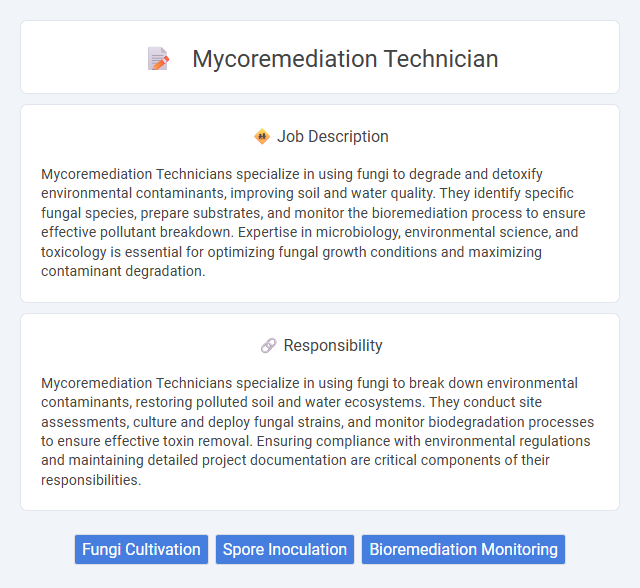
Mycoremediation Technicians specialize in using fungi to degrade and detoxify environmental contaminants, improving soil and water quality. They identify specific fungal species, prepare substrates, and monitor the bioremediation process to ensure effective pollutant breakdown. Expertise in microbiology, environmental science, and toxicology is essential for optimizing fungal growth conditions and maximizing contaminant degradation.
Individuals with a strong interest in environmental science and a willingness to work in outdoor or laboratory settings may find the role of a Mycoremediation Technician suitable. Those comfortable with hands-on tasks, including handling fungi and potentially contaminated materials, might have a higher probability of success in this job. People with allergies to mold or fungi, or those preferring strictly office-based work, could be less compatible with this profession.
Qualification
A Mycoremediation Technician must possess a strong foundation in biology, environmental science, or mycology, often holding a degree or certification in these fields. Proficiency in identifying and cultivating fungi species capable of breaking down environmental contaminants is essential. Practical experience with soil analysis, contamination assessment, and ecological data collection enhances the technician's ability to implement effective mycoremediation strategies.
Responsibility
Mycoremediation Technicians specialize in using fungi to break down environmental contaminants, restoring polluted soil and water ecosystems. They conduct site assessments, culture and deploy fungal strains, and monitor biodegradation processes to ensure effective toxin removal. Ensuring compliance with environmental regulations and maintaining detailed project documentation are critical components of their responsibilities.
Benefit
Mycoremediation technicians likely contribute significantly to environmental restoration by utilizing fungi to break down pollutants and contaminants, potentially reducing hazardous waste in soil and water. This role probably offers benefits such as a hands-on approach to environmental conservation and the opportunity to work with innovative, sustainable technologies. The position may also provide a sense of purpose by helping to restore ecosystems and improve public health through natural remediation methods.
Challenge
A Mycoremediation Technician likely faces complex challenges in managing fungal species to effectively break down environmental pollutants. The role probably demands continuous problem-solving to optimize conditions for fungal growth and pollutant degradation. Adapting to variable site conditions and contaminant types may increase the difficulty of achieving consistent remediation outcomes.
Career Advancement
Mycoremediation Technicians specialize in using fungi to detoxify contaminated environments, offering expertise in sustainable environmental restoration. Career advancement opportunities include progressing to roles such as Environmental Scientist, Mycologist, or Project Manager within ecological consulting firms and environmental agencies. Gaining certifications in environmental science and fungi biology enhances prospects for leadership positions and specialized research roles.
Key Terms
Fungi Cultivation
Mycoremediation Technicians specialize in cultivating fungi to break down environmental pollutants and contaminants efficiently. They manage fungal growth conditions, including temperature, humidity, and substrate composition, to enhance biodegradation processes. Expertise in identifying fungal species with high mycoremediation potential supports effective soil and water detoxification projects.
Spore Inoculation
Mycoremediation technicians specialize in applying fungal spores to contaminated environments to accelerate the natural breakdown of pollutants. Spore inoculation involves distributing specific fungal spores onto soil or water surfaces, enabling effective degradation of hydrocarbons, heavy metals, and organic toxins. Mastery in spore handling and deployment techniques ensures optimal fungal growth and maximum remediation efficiency.
Bioremediation Monitoring
Mycoremediation Technicians specialize in bioremediation monitoring by utilizing fungi to degrade environmental contaminants effectively. They analyze soil and water samples to track the progress of fungal remediation processes, ensuring pollutant levels decrease according to environmental safety standards. Expertise in fungal biology and environmental science enables accurate assessment and optimization of bioremediation strategies.
 kuljobs.com
kuljobs.com